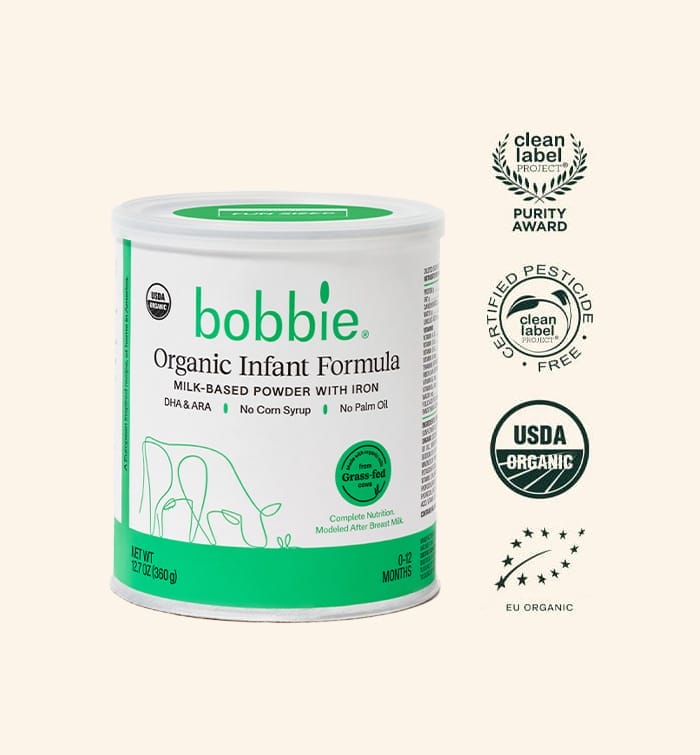We are proud to say that these posts are not sponsored. Our editorial team of Bobbie moms and writers personally select each featured product. If you buy something through our links, we may earn an affiliate commission, at no cost to you.
Can you breastfeed and formula-feed a baby? The short answer is YES. It’s called combination feeding, or more commonly, combo feeding. If you’re looking to supplement and extend your breastfeeding journey or if you want to make feedings possible by other parents or care-takers, combo feeding can be a great solution.
We sat down with Tiffani Ghere, a pediatric dietician, certified specialist in Pediatric Nutrition, and Bobbie medical advisor. It turns out that formula milk and breast milk aren’t black and white options. Here’s what we learned.
- Is it ok to breastfeed and formula feed at the same time?
- 4 Tips to help ease your baby into combo feeding
- How does the transition from breast milk to baby formula affect mom?
- Benefits of breastfeeding for mom and baby
- Why parents choose formula feeding
- Doctors may recommend supplementation
- Our take on combo feeding
Is it ok to breastfeed and formula feed at the same time?
Often times, there’s a conversation about exclusively breastfeeding or exclusively formula feeding. It can make new parents feel that they have to make a choice. But did you know it’s actually quite easy to combo feed?
We’ll give you a few pointers about what to consider if you decide to have both bottles of baby formula and bottles of breast milk on your little one’s menu.
A mother’s intuition helps decide the feeding choice
Following your intuition is always best! Trust what you think is right for your baby. You have the power to make great decisions for your baby, so don’t let anyone sway you otherwise.
Talk to your health care providers and your baby’s pediatrician to feel confident in the decision that works best for you and your family.
Is nipple confusion a concern?
When you mix formula feeding and breastfeeding in a baby’s diet, they likely won’t fuss about the real nipple or bottle nipple. They may not even know the difference most of the time, and nipple confusion isn’t as prominent as most expect.
Some doctors may recommend exclusive breastfeeding for the first few weeks until you introduce a bottle of formula to give them an easier introduction.
Breastfeeding poop can be different than formula poop
Since there’s a different type of milk entering your baby’s system, it makes sense that it may exit differently, too. Keep this in mind and watch to see if your baby’s stool looks different or irregular. Formula poop can be different than breast milk poop.
Make a note of how your baby is digesting their new diet, and seek the advice of your pediatrician if you have any concerns.
4 Tips to help ease your baby into combo feeding
If you’ve decided to start combo feeding, these helpful tips will make the transition easier for mom and baby alike.
1. Create similarities in the feedings
Give your baby as much of a similar experience as possible. This will give them a more familiar routine that they can look forward to, and it can help eliminate any nipple confusion they may experience.
Pro tip: When formula feeding, give your baby skin-to-skin contact and switch them from side to side to give the illusion of breastfeeding. This can help make the transition much easier for both you and your baby.
2. Space out formula feedings
Since organic baby formula and breast milk are two separate mixtures, it’s best to introduce the formula slowly to better support your baby’s digestion. You can slide in a bottle of formula a couple of hours after the initial feeding session to get your infant used to the taste. This can make things much easier for you in the long run.
3. Choose formula closely related to breastmilk
Our breast milk supply provides nutrients that can only be found wholly in our breast milk. But, thanks to modern science, there are similarly-composed baby formulas in the shopping aisle.
That being said, pay attention to which baby formulas have the quality ingredients and sourcing that you are looking for. If organic or non-gmo products are important to you, there are options. If you are looking for cow’s milk vs. a vegan formula, you can specifically look for that as well.
Talk to your pediatrician about vitamin D supplements—whether you’re breastfeeding or bottle-feeding—to ensure your baby is getting all of the nutrients they need.

Shop Bobbie Organic Infant Formula
Bobbie Organic Infant Formula is a USDA Organic, EU-style infant formula that meets all FDA requirements. It is a complete nutrition milk-based powder modeled after breast milk and is easy on tummies. It is non-GMO and doesn't have corn syrup, palm oil, or maltodextrin. Learn more about Bobbie.
4. Look for the “Feeling Full” signal
Your baby will become well-versed in telling you when he’s no longer hungry. Trust and watch to make sure his weight-gain patterns are normal as he grows and develops, as this is an excellent sign of properly taking to a combination diet.
How does the transition from breast milk to baby formula affect mom?
The transition from breast milk can affect your body’s milk production in a few ways. Medical experts suggest making a clean switch if you feel comfortable doing so or doing so gradually if that works best for you.
To ensure a smooth transition, you can try these techniques to start:
A new feeding routine can disrupt your body’s milk production
Expert Tip: Try starting with one bottle of formula per day.
A new routine might throw your body off its game, and your body’s milk production system may not understand the transition right away. If you’re pumping multiple times per day and then instantly move to pump only once per day, your milk supply can drop pretty rapidly and may not be there if you really need it down the line.
Some parents like to start by replacing the night bottle with formula. This can help by allowing other people to participate in feeding as well, and it can become part of the regular nighttime feeding routine.
Your body may struggle to adjust to the new routine
Expert Tip: Build up the formula usage slowly, and don’t stop pumping right away.
Your body may not demonstrate that it can handle the new routine. It may even cause breast engorgement or blocked milk ducts. If you’re struggling with the switch, you may need to build up the formula usage gradually.
Additionally, it’s okay to pump even if the milk is not being used. It may even get rid of the heaviness you might feel if the breast milk isn’t released. You can store up the extra breast milk and extend the feeding journey using both breast milk and formula.
Benefits of breastfeeding for mom and baby
We don’t often talk about this, but breastfeeding delivers many benefits not only to your baby but also to you! The list of benefits to you and baby is long, here are a few key benefits worth mentioning:
- Babies may have a more well-supported immune system during childhood due to antibodies in breastmilk.
- Colostrum (found in breast milk) can support the baby’s digestive system to help with growth and proper functioning.
- Breast milk adapts as your baby grows.
- Even partial breastfeeding may promote quicker recovery after giving birth.
- Breastfeeding saves money.
- Breastfeeding may help lower the risk of certain diseases like ovarian cancer, breast cancer, and diabetes.
Why parents choose formula feeding
With all of life’s twists and turns, there are many reasons parents may formula feed from day one or choose to exclusively breastfeed before making the add or switch to baby formula. As with breastfeeding, there are amazing benefits for both you and your child when it comes to using baby formula:
- Formula feeding is very convenient; babies can be fed any time they express hunger cues.
- Availability of the exact amount of milk needed means pumping doesn’t need space on your personal schedule.
- Allows teamwork–your partner and other caretakers have the ability to help feed if needed.
- Allows you the ability to schedule feedings, especially with low milk supply not being a concern.
- Allows you to be less worried about your diet, including the revived ability to consume alcohol.
Doctors may recommend supplementation
Sometimes, the choice to nurse versus formula feed is truly out of your control. If a baby isn’t reacting well to your breastmilk, there could be a deficiency or even an allergy that needs to be addressed. It could also be related to how the baby’s body reacts to different ingredients or products.
It’s important to remember that there’s no reason to feel pressure that your breastfeeding journey didn’t go as planned. Adding formula, otherwise known as supplementing, to your breastfeeding routine is very common.
A doctor may recommend formula supplementation if:
- A newborn loses a percentage of their body weight during the first few days of life.
- A newborn gains significant weight after the first few days of birth.
- A baby becomes dehydrated and demonstrates this through fewer wet diapers.
- A baby appears dissatisfied after feeding and, therefore may need more nutrition.
Ghere also shared that, “Supplementing may start as early as the first few days of life if the baby has lost too much weight and/or mom’s milk supply hasn’t been established. Other moms begin around 3-4 weeks to get the baby used to some bottle feeding, to allow others to feed the baby, or if mom has to return to work.”
She even goes on to say that supplementation can support the mother’s health as well: “The truth is, supplementing happens whenever mom doesn’t have enough milk, the baby needs more than mom can supply, or someone other than mom is feeding the baby. It’s not an all-or-nothing choice. New parents need options and the flexibility to meet both the baby’s and mom’s needs.”
The decision or recommendation to supplement is always for the good of both parties, and no one would want it any other way!
Our take on combo feeding
So, is it ok to breast feed and formula feed a baby simultaneously?
After looking at both options and weighing the benefits of each, there really is no wrong decision when it comes to formula feeding versus breastfeeding. It is a personal choice, unique to each situation.
If you choose to breastfeed, formula feed, or both, this is perfectly fine unless otherwise directed by your pediatrician–we can’t stress enough that your pediatrician is the true expert to your specific journey with your little one! Remember, no two families’ journeys are the same!

Shop Bobbie Organic Infant Formula
Bobbie Organic Infant Formula is a USDA Organic, EU-style infant formula that meets all FDA requirements. It is a complete nutrition milk-based powder modeled after breast milk and is easy on tummies. It is non-GMO and doesn't have corn syrup, palm oil, or maltodextrin. Learn more about Bobbie.
Sources:
What Is Colostrum? Nutrition, Benefits, and Downsides | Healthline
Combining Breastfeeding and Formula Feeding | VeryWell Family
Supplementing With Formula: Combining Breastfeeding and Bottles | What to Expect

